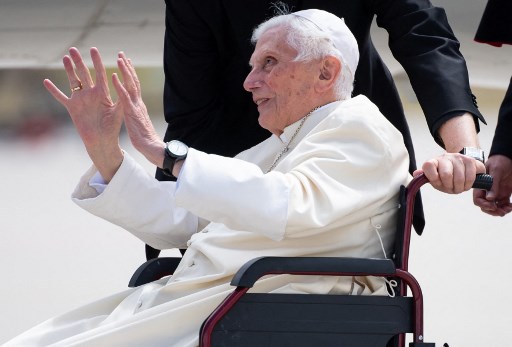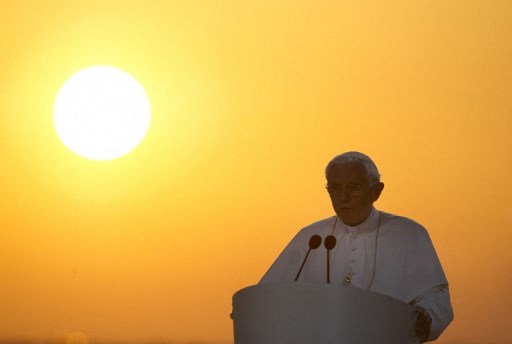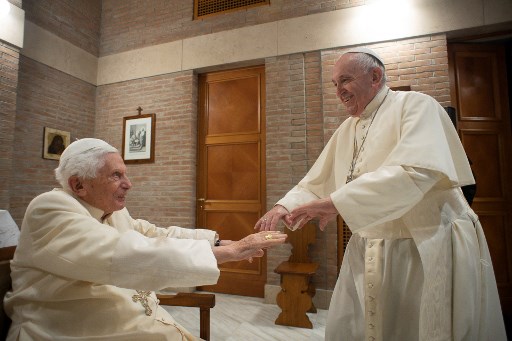
by Femke COLBORNE
Agence France Presse
BERLIN, Germany (AFP) — A potentially explosive report into the handling of child sex abuse in the Catholic Church will on Thursday be published in Germany, with former pope Benedict XVI among those in the spotlight.
The report by law firm Westpfahl Spilker Wastl (WSW) will analyse how abuse cases were dealt with in the archdiocese of Munich and Freising between 1945 and 2019.
The Munich archdiocese, which commissioned the report, said it will examine “whether those responsible complied with legal requirements… and acted appropriately in dealing with suspected cases and possible perpetrators”.
Ex-pope Benedict — whose civilian name is Josef Ratzinger — was the archbishop of Munich from 1977 to 1982.

During this time, a now notorious paedophile priest named Peter Hullermann was transferred to Munich from Essen in western Germany where he had been accused of abusing an 11-year-old boy.
Hullermann was reassigned to pastoral duties despite his history.
In 1986, by which time Ratzinger had been transferred to the Vatican, he was convicted of molesting more children and given a suspended prison sentence.
Even after the conviction, he continued to work with children for many years and his case is regarded as a pertinent example of the mishandling of abuse by the Church.
Benedict has denied knowing about the priest’s history.
– 82-page statement –
The ex-pope has provided an 82-page statement in response to questions from WSW, according to German media reports.
The pope emeritus “takes the fates of the abuse victims very much to heart” and is fully “in favour of the publication of the Munich report”, his spokesman Georg Gaenswein told the Bild daily.
Benedict, 94, in 2013 became the first pope ever to step down from the role in 600 years and now lives a secluded life in a former convent inside the grounds of the Vatican.

The reformist Catholic group “Wir sind Kirche” (We are Church) called on the ex-pontiff to take responsibility for what happened while he was in charge of the Munich diocese.
“An admission by Ratzinger that through his actions or inactions, knowledge or ignorance, he was personally and professionally complicit in the suffering of many young people would be… an example for many other bishops and responsible persons,” it said in a statement.
Germany’s Catholic Church has been rocked by a string of reports in recent years that have exposed widespread abuse of children by clergymen.
A study commissioned by the German Bishops’ Conference in 2018 concluded that 1,670 clergymen in the country had committed some form of sexual attack against 3,677 minors between 1946 and 2014.
– ‘Systemic failure’ –
However, the real number of victims is thought to be much higher.
Another report published last year exposed the scope of abuse committed by priests in Germany’s top diocese of Cologne.
Cardinal Reinhard Marx, the current archbishop of Munich and Freising, last year offered Pope Francis his resignation over the church’s “institutional and systemic failure” in its handling of child sex abuse scandals.
However, Pope Francis rejected his offer, urging the cardinal known for his reforms to stay and help shape change in the Catholic Church.
As archbishop in Munich since 2007, Marx could also find himself under scrutiny in the WSW report.
Friedrich Wetter, who held the role from 1982 to 2007, is also still alive.
The abuse scandal has thwarted the Catholic Church’s efforts to spearhead broad reforms in Germany.
It counted 22.2 million members in 2020 and is still the largest religion in the country, but the number is 2.5 million fewer than in 2010 when the first major wave of paedophile abuse cases came to light.
Payouts for victims of abuse were increased in 2020 to up to 50,000 euros ($56,700), from around 5,000 euros previously, but campaigners say the sum is still inadequate.
Ahead of the publication of the Munich report, the Eckiger Tisch victims’ group called for “compensation instead of hollow words”.
“Far too many children and young people have fallen victim” to a system “shaped by abuse of power, intransparency and despotism”, said Matthias Katsch, a spokesman for the group.
© Agence France-Presse








